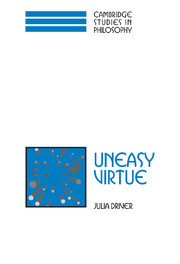1 - The Aristotelian Conception of Virtue
Published online by Cambridge University Press: 22 July 2009
Summary
In the recent resurgence of interest in virtue, Aristotle's theory has pride of place. He provided one of the first comprehensive theories of virtue, one that placed a great deal of emphasis on the exercise of our rational faculties and the integration of the rational with the emotional. It is an attractive theory because Aristotle focused on the issue of what it was to be a good person in developing his theory. Many recent ethicists find this a welcome relief from theories that focus on the evaluation of action. The Aristotelian view has become extremely influential. For example, Alasdair MacIntyre views the Aristotelian tradition as the one that will save ethics from aimless fragmentation (MacIntyre 1979). Rosalind Hursthouse has recently presented a neo-Aristotelian account of virtue ethics (Hursthouse 1999). John McDowell appropriates the Aristotelian idea that virtue involves correct perception of morally relevant facts (McDowell 1979). The virtuous agent recognizes what is good, “sees things as they are,” and acts accordingly. It is the “seeing things as they are” element of Aristotle's theory that has permeated virtue theory (see also Murdoch 1970, Blum 1991). And it has scarcely been challenged. One aim of this book is to challenge this condition of virtue. One of my claims, argued for in Chapter 2, is that correct perception, while important, is not necessary for virtue.
- Type
- Chapter
- Information
- Uneasy Virtue , pp. 1 - 15Publisher: Cambridge University PressPrint publication year: 2001



